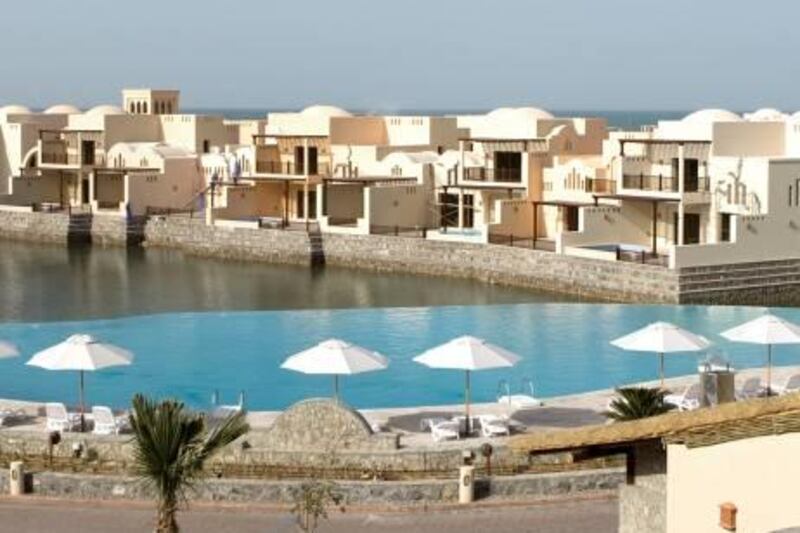DUBAI // A university aims to train both the old and a new generation of hospitality and tourism staff when it opens its doors next month in the Ras al Khaimah free trade zone.
Emirates MCC University would fill “a gap in the market” said its chairman, Tissan Thachankary. He hoped the institute would draw lower and middle-class students who might not otherwise be able to afford university.
Thanks to the low cost of launching in RAK, undergraduate and postgraduate students will pay just Dh20,000 a year. Those studying for a diploma will pay Dh18,000. The rival Vatel International Business School of Hotel and Tourism Management, also in RAK, charges Dh25,000 a year for undergraduates and Dh29,000 for postgraduates.
Whether staff worked “behind the curtain or in front”, better training and qualifications would benefit everyone, said Mr Thachankary. Hotels would have better locally trained staff and extra qualifications would help staff move to better jobs.
He expected many students would already have jobs in tourism, from housekeeping to management. Their work would give them practical credits towards their qualifications. “Eighty per cent of learning happens in the workplace, not in universities, so work integrated learning has to be part of our education. There are many experienced people with a lot of knowledge working in the industry but without any kind of certification, which they need for mobility.”
The university, accredited by the Indira Gandhi National Open University (IGNOU) in India, is part of the Munnar Catering College in Kerala. Students will have a chance to gain international experience during work placements in hotels there.
Although the MCC’s rival already works with local hotels such as the Hilton and Cove Rotana, Mr Thachankary said he had no worries about attracting students locally and from India. He said the reputation of IGNOU as well as the many jobs and better pay in the UAE made the project feasible.
“RAK is an upcoming destination so it makes sense for us to be part of that,” he said.
Youssouf Taher, the assistant head of human resources at the Cove Rotana, said there was a need for locally trained staff across the board.
“The students would have a very strong knowledge of the culture and the standards that the people living in the country are looking for,” he said.
Elena Shevchenko, who teaches tourism management at the St Petersburg University of Engineering and Economy, which has a branch campus in Dubai’s Knowledge Village, bemoaned the shortage of staff with UAE experience.
“People working here really need to be trained here,” she said. “Many have been trained in Europe, where it’s very different. It’s much more about developing personal relationships in the UAE.”
Middlesex University Dubai, a branch of the UK university, offers an international tourism bachelor’s degree. The three-year course has 80 students.
The university’s director, Raed Awamleh, said demand had dwindled, perhaps because the global economic slowdown had hit tourism hard. He also suggested these kinds of programmes were more popular with the more industry-focused vocational colleges.
He said: “The programme has been growing consistently. However, over the past two years, the rate of growth has, on average, been lower than in other areas, such as psychology or media.”
Universities do not need federal accreditation to open in the RAK free trade zone, although some have chosen to do so, and unlike in Dubai, there is no regulatory authority.
mswan@thenational.ae
Successful campuses
Indian universities in the Emirates have had mixed fortunes. Manipal, at Dubai International Academic City, launched in 2000 and now has more than 1,600 students, making it one of Dubai’s biggest and most successful campuses.
Likewise, BITS, Pilani – Dubai (BPD) is the branch campus of its Indian counterpart. Also established in 2000 and specialising in engineering, it now has about 1,700 students. The University of Pune has grown steadily since it opened in RAK in 2009, and plans to expand further still. Others, though, have floundered, often because their links with their home campuses are somewhat tenuous. In Dubai, the University Quality Assurance International Board (UQAIB) issues licences for universities. One of its conditions is that branch universities have to show that their courses, lecturers and entry requirements are as good in Dubai as at the home campus. Where the links are loose or unclear, that can be difficult. Last year, the Mahatma Gandhi University (MGU) had to move its 300 students from Dubai Knowledge Village to Ras al Khaimah after UQAIB found it did not meet these requirements. The Universal Empire Institute of Medical Sciences also moved last year after trouble with UQAIB. The RAK Free Trade Zone has no equivalent regulator, with universities accredited by the Ministry of Higher Education and Scientific Research automatically being granted licences. * Melanie Swan






